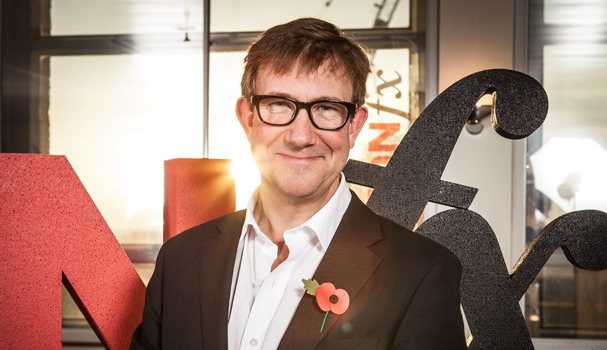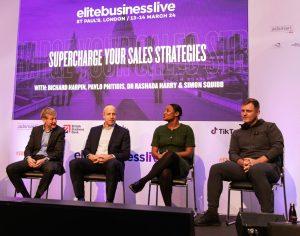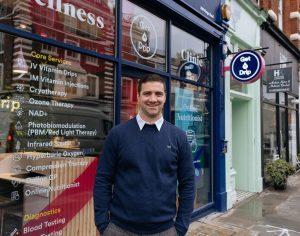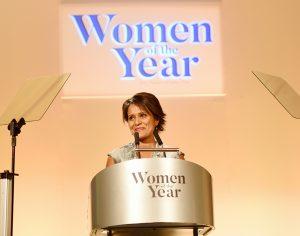“I believe we can build big businesses but we’re encouraged not to,” starts Rupert Lee-Browne, the founder of Caxton FX, a foreign exchange business. “There is this culture in the UK where we are encouraged as entrepreneurs to sell out early. That starts with your family, your friends, your lawyers and your accountants. And there’s a whole private equity industry out there begging for you to give up your wild ways and get some professionals in to run your business. Everyone surrounds you and says: ‘when are you going to sell?’”
The affable entrepreneur draws breath, leans back in his chair and smiles broadly. His grin has been his trademark since he was little. “I was quiet and charming as a child. Very small. A grin on a stick,” he says. Not that peers should have been fooled by his size. By the time he transitioned from a public boarding school to a local comprehensive at the age of 12, he had learned to use his fists. “The boarding school was tough so I learned to fight. Even though I was grinning, I was still fighting.”
The local comp was just a stop-gap during a momentary blip in his parents’ finances. “I’m the youngest of four. They ran out of cash,” he laughs. At 16, he resumed his public school education at Malvern College. “There was one boys’ school and nine girls’ schools so as a teenager that was quite fun.”
Fun seemed to be the name of the game. Lee-Browne describes his performance at school as “unremarkable”. Upon leaving Malvern at the age of 18, he took a year out in London. “I did then and I still now have a passion for art. I worked at the V&A for a short while and I worked for the Royal Academy.”
While he loved being in the Big Smoke, his first digs left much to be desired. “My first flat was the most god awful, cockroach-infested place in Chiswick, sandwiched between the M4 and two railway lines. A girlfriend came round and said: ‘you cannot possibly live here, Rupert,’ and she started packing my bags. She had a flat in Harley Street, so I went to live there.”
After three years at the University of London, Lee-Browne “hadn’t got a clue” what to do next. “At the time, the City and advertising were the two sexy things,” he explains. After rejections from “virtually every agency in the world”, he was offered a job at a media buying agency in London. Not quite the glamorous job in a full-service ad agency he had envisaged but still, it was a job.
“That was a very interesting wake-up call because I was still a country boy at heart and media buying is a very, very tough environment. It was very unpleasant at that time,” says Lee-Browne. After around 18 months in that first job, he made a rather speedy exit after “being completely stitched up” over the value of some TV ad slots. “I went to my boss and said, ‘I’m sorry, I’ve done this and I’m not entirely sure I’m very good at this job.’ That was the point at which we decided we would part company.”

A stint at BBC Enterprises (the precursor to BBC Worldwide) and the Evening Standard followed. He was also doing some consultancy work, for which he had an assistant. One evening she asked to leave early in order to attend a networking event. Curious, Lee-Browne probed further. “She said, ‘I’m going to a networking event called First Tuesday’ and asked me to come along.” It’s safe to say her boss was dubious. “Before First Tuesday, networking meant going to an awful event where you stood in the corner with a cup of coffee being bored to death by some short, fat, bald bloke and being ignored by everyone else.”
He was pleasantly surprised. First Tuesday, co-founded by serial entrepreneur and investor Julie Meyer, became an institution and a must-attend event for any entrepreneur in the digital melee. “First Tuesday was absolutely extraordinary. You walked in and the first person you bumped into said: ‘tell me about what you’re doing.’ It was a revelation.”
It was here he bumped into a celebrity restaurateur contact who was looking to invest in a new venture. “As a true consultant, I said to him, ‘what’s the problem in your industry?’ and he told me it was the supply chain; the problem of ordering food at the end of every day.”
That conversation was the beginning of EggsBenefit (“Egg-celent name, don’t you think?”). It was 1998 and internet businesses were flying. The company grew fast; by the time Lee-Browne left in 2000, it had 120 staff. It was seat-of-the-pants stuff, says the entrepreneur. “It was rather like war: intense moments of fear and then small times of elation and not quite knowing what you’re doing but making it up as you’re going along.”
Lee-Browne jumped ship before it sank. Although he and his co-founder had put the company together, by this time it had a chief executive at the helm who was charged with raising the next round of finance. “They didn’t need me,” he says. “We were doing exactly what everyone else was doing, which was raising enough money to set up the business, enough money to prove the business and then the next funding round was to roll out the model.”
The flaw in the plan was that the dot com bubble was reaching bursting point. “The writing was slightly on the wall,” admits Lee-Browne. “I got out with my shirt intact.”
Though his first entrepreneurial endeavour hit the runners, it was far from a waste of time. “I learnt a lot of lessons, particularly about partners and who you choose to do business with. Partners can be dangerous things,” he says, enigmatically. His first foray into business also taught him the value of growing slowly and sustainably. “We undoubtedly grew too fast. It’s important to manage growth and make sure it’s sustainable over a long period of time.”
He was determined his next venture wouldn’t be a flash in the pan. After a spell helping get a currency business IPO-ready, he found his feet in the industry. “There was so much opportunity to do things in a different way. At the time foreign exchange was all about confusing the customer, it was about taking as much as you could out of the customer on that particular deal. It was about being an aggressive young man in red braces,” he says.

Lee-Browne spotted the gap in the market for a customer-focused service. “Here was a market made up of people with money who valued customer service and valued a transparent, honest, integrity-based business, rather than one that’s fast and loose and splashing the champagne.” He couldn’t have been frivolous even if he’d wanted. “I started with £25,000 so I couldn’t spend any money. Every single penny was required. I still have the same approach now; every single penny is watched over.”
In addition to his initial £25,000 investment, he was on to a promise with four external investors. But as he got closer to launch, each one pulled out. A friend encouraged him to go it alone, so armed with a telephone he started Caxton FX in December 2002 from a tiny office in Belgravia. “The address was important to me because I didn’t want to appear like I was in the City and I didn’t want to have it running out of my flat,” says Lee-Browne.
He put an ad on Google and 20 minutes later, the phone rang. “It was a Welshman who wanted to buy a house in France. It was a bit of a scramble because I hadn’t quite got my banking arrangements in place and he kept calling up saying he wanted to buy some euros.”
From the off, Lee-Browne decided that Caxton FX would only play in the money transfer market. “We didn’t want to go anywhere near the cash market which I perceived as being quite low-grade. It’s expensive too – it cost us the same to do a large transaction as it did to do a small transaction. So why would we go for the small transactions?”
The key to Caxton’s success would be simplification of an opaque market. “What customers want to know is, ‘I’m buying my house in France’ or ‘I’m buying my Bugatti in America’ or ‘I’m buying my yacht in St Tropez – how am I going to get my best price? And how do I reduce my risk in my transaction?’”
Lee-Browne’s customer-centric approach knows no bounds. When the French post office lost track of some money wired to a client, the founder hopped on a Ryanair flight to deliver a banker’s draft in person. After launching its pre-paid cards in 2007, which are essentially debit cards with pre-loaded currency of the customer’s choosing, the UK post office failed to deliver a school’s stash of cards prior to a ski trip. “One of our guys cycled through the snow to the school in Dulwich with his bobble hat on so the kids would have their cards for the ski trip,” recounts Lee-Browne.
Each one of the company’s “90-something” staff are instilled with the belief that amazing customer service is at the centre of everything they do. This became particularly important after the launch of the pre-paid cards. “I knew we’d made a horrendous mistake outsourcing all of our customer services because I started to get phone calls from my friends saying: ‘what the hell is going on, I haven’t got this,’ or ‘the card doesn’t work’.”
In response, Lee-Browne set up a call centre in Belgravia, “the most expensive call centre in Christendom”. But the customer services team were now outside his door. “I knew exactly what was going on. The success of this programme is down to the fact that we have had amazing people on the phones dealing with customers’ problems. We don’t have any sort of KPIs in terms of the amount of time employees have to spend on the phone call with a customer – you’ve got to be on that phone call for however long it takes to keep that customer satisfied.”

The pre-paid cards have been a smash hit: they now account for more than 50% of Caxton’s £760m turnover. What’s more, customers are so delighted they have been investing their money to help the company grow further. Caxton FX issued its first bonds in 2011. “Three years ago we ran what was then a very innovative scheme: we raised just shy of £3m to help us grow faster from people outside the business. It’s an unsecured debt that we paid back at 7.25% over a four-year fixed term.”
The scheme was such a success that the company did it all over again earlier this year. “We needed more money to grow further and faster so this time we had a target of £5m to raise,” explains Lee-Browne. The first batch of bondholders were so thrilled with the scheme the first time around that 75% of them rolled over into the new bond. “We then sent an invitation to the rest of our customers and we filled the whole thing from start to finish in two and a half weeks.”
There surely cannot be a better vindication of Caxton’s emphasis on customer service. “It’s entirely our customers who are investing. No one else. That’s why the consistency of amazing service is our key success. It’s about trust: if we gave patchy service, if we dealt with complaints badly or if we didn’t do what we said we were going to do, there would be a lack of trust there,” explains Lee-Browne. “If we didn’t go that extra mile then we wouldn’t have trust and we wouldn’t have customers to say, ‘I love what you’re doing and I trust you for the next four years with my money.’”
This isn’t to say Lee-Browne is entirely without regret. He wishes he’d implemented more formal HR processes earlier. “When you start a business it’s pure hell – you can’t attract the right people because nobody’s attracted to a thing with one telephone and a bloke who shouts a lot. Or the people who are attracted are not necessarily the best. You can put those processes in place to ensure that you get the right person, understanding what their expectations are. We would have progressed a lot further, faster if we’d concentrated on people.”
Still, Caxton FX’s success speaks for itself. What’s Lee-Browne’s secret? “I’ve boiled business down to two things. One is people and the other is cash. With any startup, cash can be the real killer.” Even 12 years in, he keeps a beady eye on the bottom line. “ We’ve got a fantastic finance team but I sign off every purchase order,” he explains. “Madonna does the same thing: she signs every cheque. And she’s hardly unsuccessful.” ![]()
Share via:


















































